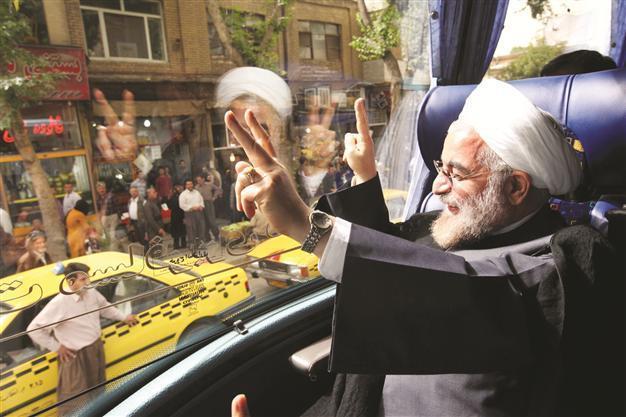Iran’s Rouhani signals softer line on liberties
TEHRAN

Iranian president-elect Hassan Rouhani waves from his bus during his presidential election campaign tour. Rouhani said it was time for real change in the role of government in everyday life. ‘Government’s involvement in the social and private lives of people should decrease,’ he said. AP photo
Iranian president-elect Hassan Rouhani has called on the government and powerful clergy to end interference in the private lives of Iranian people, free up Internet access and allow state media to be more open about the country’s problems.
“There shouldn’t be any rift or division between the government or the clergy especially at a time when people have pinned their hopes on seeing some sort of change in society,” Rouhani, a mid-ranking cleric, told clergy. “A strong government does not mean a government that interferes and intervenes in all affairs. It is not a strong government that limits the lives of people,” said Rouhani, who takes office early next month. He collected 52 percent of the vote, winning a surprise victory in the June 14 presidential election.
Rouhani said it was time for real change in the role of government in everyday life. “Government’s involvement in the social and private lives of people should decrease,” he said.
“The power of the government lies in improving popular trust and ... offering services, decreasing problems, setting the stage for further development of all citizens to help meet the needs of the people and desire for change,” he said in an address aired on state television. Rouhani is bolstered by his popular mandate and the backing of an alliance of moderates and reformers led by former presidents Akbar Hashemi Rafsanjani and Mohammad Khatami, both sidelined by hardliners under Mahmoud Ahmadinejad.
During his election campaign, Rouhani demanded a loosening of the “security atmosphere” and July 3 signaled what steps he wanted to see taken. Filtering of the Internet in Iran had proved ineffective, Rouhani said on Twitter. “What important piece of news has filtering been able to black out in recent years?” he asked. He said some of the measures taken by the authorities to restrict users’ access online was not done in good faith and was instead politically motivated.
Fear of ‘online freedom’ “They have fears of the freedom people have in the online atmosphere, this is why they seek to restrict information. But filtering is incapable of producing any [useful] results,” he said, the British daily Guardian reported. Iranians have hardly access to websites like Twitter through anti-filtering software or virtual private network (VPN) services. He also noted that the social networking sites such as Facebook were a welcome phenomenon. “I remember that [former president] Ayatollah Hashemi Rafsanjani once called Facebook a welcome phenomenon. Indeed they are.”
At the same time, the new president criticized state broadcaster IRIB for ignoring issues inside Iran. “When IRIB airs the birth of a panda in a Chinese zoo but nothing about unpaid workers protesting, it is obvious that the people and youth will ignore it,” Rouhani tweeted.
Speaking on censorship of art, Rouhani said the state, instead of interfering in the affairs of artists and cultural figures, should provide them with security. “We should not tighten the red lines all the time, we should show that censorship is not our goal.”
He also came out in opposition to the segregation of men and women, including at universities.
Rouhani said he was against the crackdown against women with loose clothing. He underlined that if a woman or a man does not comply with their rules for clothing, his or her virtue should not come under question. “Many women in our society who do not respect our hijab laws are virtuous. Our emphasis should be on the virtue,” he said.
